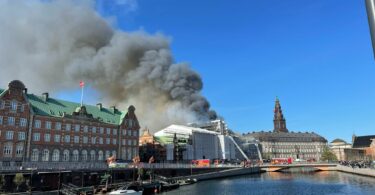Edinburgh, U.K. – It’s past Halloween, supermarkets insist that we stock up on mincemeat and frozen Brussel sprouts, and the Starbucks red cups are back. But there is something in the air other than the smell of nutmeg that stops some of us from getting “that warm, fuzzy feeling” and getting into the jolly festive spirit.
A newly published report by the Intergovernmental Panel on Climate Change offers dire warnings for the planet if action isn’t taken now.
The Special Report on Global Warming of 1.5C. concludes that limiting global warming to 1.5C would require “rapid, far-reaching and unprecedented changes in all aspects of society.”
But if humans don’t make changes, the path we are on now would lead us to global temperature increases far beyond 2*C, and result in long-lasting or irreversible changes.
The United Nations Environment Programme and the World Meteorological Organization established the Intergovernmental Panel on Climate Change in 1988 to provide regular scientific assessments concerning climate change for policymakers.
In its Oct. 10 report, the panel sees no bright future for coral reefs, which protect coastlines and play an important role in nutrient cycling. However, at least 70 percent are predicted to decline, whereas virtually all would be lost with 2 degrees Celsius global warming.
The effects of a 1-degree Celsius temperature increase are already apparent. They include rising sea levels, diminishing Arctic ice cover, and more extreme weather events. These are all expected to continue, according to information released by the panel.
Further, the panel said humans would need to cut their global net CO2 emissions by 45 percent from 2010 levels to 2030, and reach ‘net zero’ carbon emissions around 2050. In addition, some carbon dioxide will have to be removed from the air.
“The next few years are probably the most important in our history,” Debra Roberts, who co-chairs one of the panel’s working groups, said in a press release.
In the same press release, Valerie Masson-Delmotte, who co-chairs a different working group, said that while actions to limit global warming are already underway across the globe, they need to accelerate.
With an environmental and social catastrophe approaching within a few decades’ time, people may feel shaken and scared. Humans have 12 years to greatly improve the way we interact with the environment, and we need large-scale changes now.
There is no time for individual action – but at the same time, individual action is the most important it’s ever been. We still count, and we have to show the world we care if we want to continue living on this planet in the relative comfort we have now.
Our scientific understanding of human-caused changes to the environment has greatly improved over the last two decades and solving the global warming issue is a matter of accepting and implementing policies and technologies.
Our responsibility is to make it happen.
What is it, then, that you can do? Find a way to show the Members of Parliament or other governmental leaders in your country that we need change. Push them to pass legislation and execute it. See what others have done and be inspired by their actions.
Make changes in your closest environment. Shop less, buy locally grown food, reduce and reuse, break out of the cult of consumerism that’s been driving our kind to extinction.

With Christmas around the corner there could be no better opportunity to resist conspicuous consumption. You could quit overspending on presents and instead create some value time with your closest friends and family.
Try investing in experiences. Go to the nearest nature park and making a donation.
Prepare less food, or at least make the effort to prevent any leftovers from going to waste.
You could pledge to not buy new Christmas clothes or decorations and reuse those from last year. Consider getting handmade or second-hand items as presents for your family. Handed-down doesn’t mean ungenerous.
Many of us will be heating our homes now as the cold season started on the northern hemisphere. Take some time to think about the environmental cost of your comfort. Does it involve burning coal? If so, perhaps it is worth getting involved in a local campaign for divestment from fossil fuels. Check out more resources at the Alliance for Climate Education website.
Whatever you choose to do, share the message with others – if you care, that is. And if you are a human living on Earth, you should.
Joanna Koter is a Senior Reporter with Youth Journalism International.



